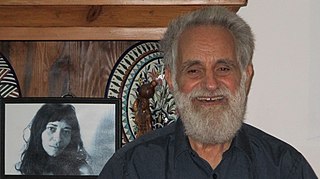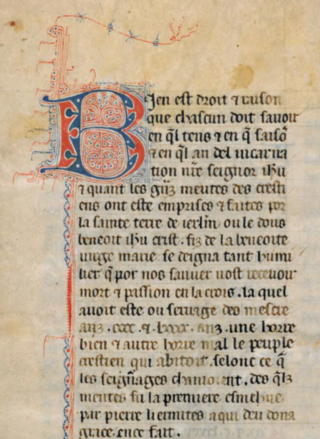Related Research Articles

Amka, also known in Arabic as Amqa, is a moshav in the Matte Asher Regional Council of Israel's Northern District, near Acre. The location of the moshav roughly corresponds the former Palestinian village, depopulated during the 1948 Arab–Israeli War. Yemenite Jews founded the village's successor Amka in 1949. In 2021 its population was 822.

Suhmata, was a Palestinian village, located 25 kilometres (16 mi) northeast of Acre. It was depopulated by the Golani Brigade during the 1948 Arab-Israeli war.
The Council of Piacenza was a mixed synod of ecclesiastics and laymen of the Roman Catholic Church, which took place from March 1 to March 7, 1095, at Piacenza.
Joshua Prawer was a notable Israeli historian and a scholar of the Crusades and Kingdom of Jerusalem.
Balian of Ibelin was the Lord of Arsuf from 1258 until the early 1260s, when he leased it to the Knights Hospitaller. He was the son and successor of John, Lord of Arsuf and Constable of Jerusalem. At the time when he leased/rented it to the hospital, his fief of Arsuf was worth six knights' fees and twenty sergeants'; the Hospital took up his obligations with the exception of the servise de cors.

Mi'ilya is an Arab local council in the western Galilee in the Northern District of Israel. Its name during the Kingdom of Jerusalem era in Galilee was Castellum Regis. In 2021 it had a population of 3,267, all of whom are Melkite Greek Catholics. The town is located immediately to the northwest of Ma'alot-Tarshiha.

The Colmar Treasure or Colmar hoard is a hoard of precious objects buried by Jews of the Holy Roman Empire at the time of the Black Death pogroms.
Gustav Reinhold Röhricht was a German historian of the Crusades.
The 1202 Syria earthquake struck at about dawn on 20 May 1202 with an epicenter in southwestern Syria. The earthquake is estimated to have killed around 30,000 people. It was felt over a very wide area, from Sicily to Mesopotamia and Anatolia to upper Egypt, mostly affecting the Ayyubid Sultanate and the Kingdom of Jerusalem. The cities of Tyre, Acre and Nablus were heavily damaged. A magnitude of Ms 7.6 has been estimated with damage up to XI on the Mercalli intensity scale.
Between 792–793 and 796 a Qays–Yaman war took place in Palestine and Transjordan between the northern Arab tribal federation of Mudhar, also called Nizar or Qays, and the southern tribal confederation of Yaman and their Abbasid allies. The conflict may have begun as early as 787/88, though specific outbreaks of the war are largely dated to 793 and 796. Some violence by Bedouin raiders in the Judean Desert also erupted in 797, though it is not clear if this was directly related to the Qaysi-Yamani conflict.

Reuven Amitai, also Reuven Amitai-Preiss, is an Israeli-American historian and writer, specializing in pre-modern Islamic civilization, especially Syria and Palestine during the time of the Mamluk Empire. In his 20s he moved to Israel, and became history professor at the Hebrew University of Jerusalem. As of 2012 he is the Dean of the Faculty of Humanities at the Hebrew University.

Nicolas Lorgne was the twenty-first Grand Master of the Knights Hospitaller, serving first from 1277 until 1285 and was the successor to Hugues de Revel. He was succeeded by Jean de Villiers, with Jacques de Taxi acting as Grand Master ad interim while de Villiers was en route to the Holy Land.

Benjamin Ze'ev Kedar is professor emeritus of History at the Hebrew University of Jerusalem. He was president of the international Society for the Study of the Crusades and the Latin East (1995–2002), chairman of the board of the Israel Antiquities Authority (2000–12) and vice-president of the Israel Academy of Sciences and Humanities (2010–15). He is 2019 The EMET Prize for Art, Science and Culture laureate in history and the 2020 Israel Prize laureate in history research.

Hugues de Revel was an English knight who became the twentieth Grand Master of the Knights Hospitaller, serving from 1258 to 1277 as the successor to Guillaume de Chateauneuf. He was succeeded by Nicolas Lorgne.
Guigues III, also numbered Guigues IV, nicknamed Branda, was the count of Forez from 1199 until his death while on the Fourth Crusade.

The Annales de Terre Sainte is a series of brief annals of the Crusades and the Crusader states from the council of Clermont in 1095 until the fall of Acre in 1291. It is untitled in the manuscripts. Its modern title was coined by its 19th-century editors. The original is in Old French, but an Old Spanish translation is also known. For the thirteenth-century Crusades, it is a valuable and independent historical source.
Jacques de Taxi was ad interim Grand Master of the Knights Hospitaller, serving in 1285 and was the successor to Nicolas Lorgne. De Taxi was appointed as acting leader of the Order prior to the arrival of Jean de Villiers in the Holy Land.

Chastelet was a castle located beside Jacob's Ford, a ford of the upper Jordan River in Israel. The castle was built during the Crusades by the Knights Templar and the forces of the Kingdom of Jerusalem but was destroyed by the army of Saladin in 1179.
Diego Olstein is a professor of history and department chair at the University of Pittsburgh. He was associate and interim director of the World History Center (2011–2017) and a member of the executive boards of the European Network of Universal and Global History (2005-2011) and the World History Association (2016-2018).
References
- ↑ "Prof. Roni Ellenblum" (in Hebrew). Geography Department, Hebrew University of Jerusalem. Retrieved 26 January 2021.
- ↑ "Prof. Roni Ellenblum". Israel Academy of Sciences and Humanities . Retrieved 26 January 2021.
- 1 2 3 4 5 "Ronnie Ellenblum: List of Publications" (PDF). Hebrew University of Jerusalem (HUJI). July 2013. Retrieved 26 January 2021.
- ↑ "Vadum Iacob Research Project".
- ↑ "Historic Cities (maps, literature, documents, books and other material)". Hebrew University of Jerusalem. Retrieved 26 January 2021.
- ↑ "Revised Regesta Regni Hierosolymitani–calendar of documents regarding the Crusader States and Cilician Armenia, based on Reinhold Röhricht's 1893-1904 work, refashioned by J. Riley-Smith, with assistance from R. Ellenblum, B. Kedar, I. Shagrir, A. Gutgarts, P. Edbury, J. Phillips and M. Bom" . Retrieved 26 January 2021.
- ↑ "The Collapse of the Eastern Mediterranean". Cambridge University Press website. Retrieved 26 January 2021.
- ↑ In laudem Hierosolymitani..., book excerpts at Amazon.com. Accessed 26 January 2021.